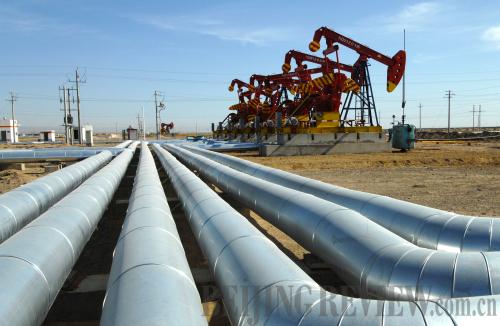|
 |
|
HIGHER PRICES, HIGHER TAXES: An oil extraction site of the Xinjiang Oilfield Co. In June 2010 China began a trial in Xinjiang which levied resource tax on crude oil and natural gas by value instead of volume (JIANG WENYAO) |
After a year of experimental reform on the resource tax ratio in China's western Xinjiang Uygur Autonomous Region, the State Council announced on September 21 to add the method of levying the resource tax ratio by value to the existing practice of levying the ratio by volume only. It will also change resource tax rates on crude oil and natural gas.
In June 2010 the reform of resource tax was first introduced in Xinjiang. According to the provisions jointly released by the Ministry of Finance (MOF) and State Administration of Taxation, the trial tax rate on crude oil and natural gas production by value was 5 percent. As of December 1 last year the reform was further expanded to 12 provinces and autonomous regions in west China.
China began to consider resource tax reform as early as 2007. However, the reform was put on the backburner for various reasons, with the most important being concerns about price hikes of resource products and further intensified inflation pressure after the tax is introduced. Particularly, the continuously growing Consumer Price Index (CPI) had blocked the progress of resource tax reform.
In August this year, when the CPI was estimated to peak and then drop, a precious window was open for reform.
Liu Shangxi, Deputy Director of the Research Institute for Fiscal Science of MOF, said it is well timed for China to expand the resource tax reform nationwide now. On one hand, China is focusing on environment protection and reducing emissions, and resource tax reform complies with this direction; and on the other, since the prices of resource products are appropriate compared with the country's overall price level, now may be the opportune moment to promote resource tax reform.
The main reason for China to reform the resource tax scheme is that past taxation methods were unreasonable and unable to curb the waste of resources.
After the reform, tax collected per unit of resource will increase substantially. Take crude oil for example. If only taxed by volume, as is done now, an oil company needs to pay a resource tax of 8-30 yuan ($1.26-$4.71) for each ton of oil it has produced. But if taxed by value with a tax rate of 5 percent, an oil company must pay 256 yuan ($40.19) of resource tax for each ton of oil given a factory price of 5,118.7 yuan ($803.56) per ton in August this year.
Fighting inflation is the focus of China's economic work at present. But affected by the prices of resource products, particularly rising oil prices that have caused price hikes of related downstream products and services, the CPI has risen quickly this year. People are concerned that the resource tax will push up prices of resource products such as refined oil and natural gas and then further push up the CPI which just began to decline.
Zhou Dadi, Deputy Director of the National Energy Advisory Committee of Experts, said whether the reform will push up prices of resource products is decided by the tax rate. The present adjustment of the resource tax scheme is stable, and the government did not fix a high tax rate in one blow.
According to Zhou, current domestic oil prices are mainly adjusted in accordance with international oil prices, therefore adjustment of the resource tax scheme will not push up domestic oil prices.
Yang Zhiyong, researcher at the Institute of Finance and Trade Economics of the Chinese Academy of Social Sciences, said from the experiment in Xinjiang, the reform only increases the burden on oil and gas companies, and oil- and gas-related industries of which prices are not government regulated may be seriously affected. But, he stated, the adjustment of resource tax will not directly affect ordinary consumers.
Yang warned, however, related enterprises are unlikely to bear the tax burden without taking a hit to profits. When the burden is beyond their capacity, related government departments will inevitably raise the prices of their products.
An Tifu, professor at the School of Finance of Renmin University of China, said to make structural adjustments to the country's tax scheme, resource tax reform is a must. Since the reform will increase the tax burden on enterprises, the government could consider appropriately adjusting other tax items to balance the overall tax burden.
| 